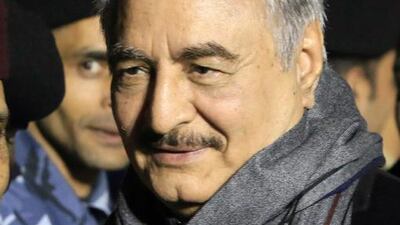Russia made a very public statement of its growing role in the Middle East this week, inviting Libya's most powerful military commander, Field Marshall Khalifa Haftar, aboard its aircraft carrier Admiral Kuznetsov, which is morred off the Libyan coast.
Russia’s defence ministry said that while aboard the warship, Haftar spoke by video link with defence minister Sergey Shoigu about battling terrorism in the Middle East.
The Kuznetsov had spearheaded air support for the Syrian government's capture of the city of Aleppo from rebel forces.
Russia’s involvement in Syria is well-entrenched, its military supplies and air strikes crucial to the president Bashar Al Assad’s recent victories. By contrast, its involvement in Libya is in its infancy.
Russia took a cautious back seat when Nato, backed by several Middle Eastern powers, deployed air power to depose Muammar Qaddafi during the so-called Arab Spring revolution in 2011.
In April that year, Vladimir Putin – then Russia’sprime minister, now its president – described the Nato bombing campaign as a “medieval call for a crusade”.
Since the fall of Qaddafi, Russia has watched from the sidelines as the country slid into civil war.
That war is between two loose alliances: Libya Dawn, which controls Tripoli and much of western Libya, and Operation Dignity, an opposition group formed by Haftar three years ago, which backs the House of Representatives parliament in the eastern city of Tobruk.
Recent months have seen Haftar, commander of parliament’s armed force, gain the upper hand, transforming Operation Dignity into the Libyan National Army. That army has pinned back rebel militias in Benghazi, Libya’s second city, to two small enclaves.
In September, the field marshal captured the country’s four central oil ports, bringing control more than half of the current production of 700,000 barrels per day under parliament’s control.
Russia’s support for Haftar, 73, has been growing ever since. In September, he visited Moscow, with Russian officials underlining that they regarded the parliament as Libya’s “legitimately elected body”.
Of concern to Moscow at the time was the ISIL presence in Libya, with Haftar’s forces battling their units in Benghazi.
He made another visit to Moscow in November, when he held talks with defence minister Shoigu and foreign minister Sergey Lavrov about countering terrorism in the Middle East.
Then in December Russia’s deputy foreign minister Gennady Gatilov, describing Haftar as a “leading political figure”, called for the partial lifting of the UN’s arms embargo on Libya to equip his forces.
Moscow has been keen to show its support for all Libyan parties, with Russia’s ambassador to Libya Ivan Molotkov meeting Fayez Al Serraj, prime-minister designate of a proposed unity government, the Government of National Accord (GNA).
Russia formally recognises the Tobruk parliament as the legitimate government, but also backed a United Nations Security Council Resolution in December 2015 calling for the GNA to become Libya’s sole government.
However, for that to happen, the parliament must first endorse the GNA. In several votes last year, MPs in Tobruk rejected the GNA on the grounds that parliament must be free to choose Libya’s armed forces commander, a very pointed show of support for Haftar.
Haftar has repeatedly stated his desire to move on Tripoli and rid it of Libya Dawn militias, a threat that has seen Dawn supporters refuse to consider him as the country’s army commander.
Yet the general is popular among many Libyans for his pledge to replace militias who have brought chaos to the country with regular army and police formations.
This week's visit aboard the Kuznetsov appears to underline Moscow's belief that Haftar must be supported. It did not invite any officials from the GNA in Tripoli.
As the holder of Africa’s largest oil reserves, Libya is probably viewed by Moscow as a valuable potential strategic partner in the Middle East , following on from its success in Syria.
Moscow’s stance may put it at loggerheads with many western powers, with both the United States and European Union having granted diplomatic recognition to the GNA, somtheing Russia has refused to do.
The big question remains whether support for Haftar will put Russia in conflict with the America’s incoming Trump administration. Last April, president Barack Obama admitted that failure to prevent post-revolution chaos in Libya was his greatest foreign policy mistake, and he has been a strong backer of the GNA.
Equally, Trump has announced his desire to cooperate with Putin, and may view Russia’s very public embrace of Tobruk’s top general as a help, not a hindrance, in bringing peace to Libya.
foreign.desk@thenational.ae

